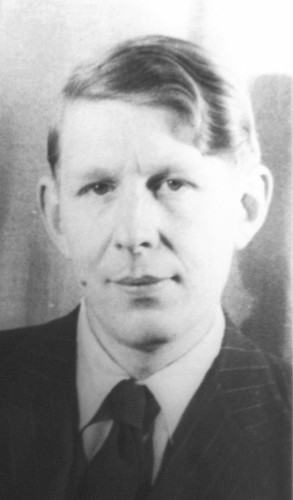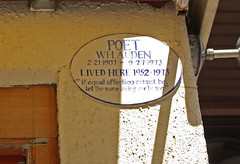So let’s hear it for the greatest writer ever to live in the East Village. What’s that, you say? James Fenimore Cooper? Leon Trotsky? William S. Burroughs? Allen Ginsberg?
Hmm. No offense to the above authors, but surely you jest. The greatest writer ever to settle in the East Village, a transatlantic literary god whose appearance was as unexpected as that hawk showing up in Tompkins Square Park, was the English-born poet, W.H. Auden, who lived at 77 St. Marks Place from 1953 to 1972. In 1917, Trotsky had edited a dissident newspaper in the same building. The painter Larry Rivers was already living there when Auden and his lover, Chester Kallman, moved in. And the man who had previously occupied their railroad apartment was an abortionist. For neighborhood “color,” you can’t top that.
The coming month is a big one in Auden’s posthumous career. (He died in Vienna on September 29, 1973.) And this fortnight, in which we will mark the 10th anniversary of 9/11, will also be a 10th anniversary of sorts for him. Seventy-two years ago today, he began writing his aphoristic, agonized, and intensely lyrical meditation on the outbreak of World War II, “September 1, 1939.” It was composed shortly after he moved to New York with his pal Christopher Isherwood (“Berlin Stories,” “A Single Man”), and 62 years later, a few days after Mohammed Atta & co. brought down the Twin Towers, the poem took on a second life among the smart set on both sides of the Atlantic.
Auden had written the poem in response to Nazi Germany’s invasion of Poland. The “psychopathic god” referred to in its second stanza is Hitler. Yet when Slate published an article about the poem nine days after the attack on the World Trade Center, its title was “Auden on Bin Laden.” Variations on that theme popped up just about everywhere you looked – in The New Yorker, Salon, The Atlantic, and many other publications.
Imagine a densely argued op-ed article written by a genius in nine rhyming verses of 11 lines, each of which you couldn’t get out of your head or even quite figure out – that’s what it felt like to read Auden’s poem during the weeks and months in which smoke poured from Ground Zero. It felt thrillingly prophetic and world-historical, befitting the atrocity that had taken place in what was then – is it still? – the world’s numero uno metropolis. An excerpt:
I and the public know
What all schoolchildren learn,
Those to whom evil is done
Do evil in return.
And later:
Into this neutral air
Where blind skyscrapers use
Their full height to proclaim
The strength of Collective Man,
Each language pours its vain
Competitive excuse:
But who can live for long
In an euphoric dream;
Out of the mirror they stare,
Imperialism’s face
And the international wrong.
In 2001, even if you regularly grazed the poems in the New Yorker, you simply didn’t come across lines like those. Poets who spoke with that measure of confidence and ambition no longer existed – at least not in America. The rapture with which “September 1, 1939” was being reread and argued about mirrored the state of feverishness in which the country understandably found itself, and it also prefigured the urge for action and certainty as well as the countervailing currents of skepticism and doubt that would end up splitting America into two bitterly opposed ideological halves.
Perhaps, despite its undoubted power, the poem was too confident, too swaggering and assured. Auden took up the prophet’s mantle in the poem:
All I have is a voice
To undo the folded lie,
The romantic lie in the brain
Of the sensual man-in-the-street
And the lie of Authority
Whose buildings grope the sky
At any rate, to the amazement and horror of his admirers (it would be was as if Picasso had disowned “Guernica”) Auden soon began to disavow the poem and finally banned it from publication altogether. He described its most celebrated line (“We must love one another or die”) as “a damn lie,” since we were all going to die anyway, and the poem itself as “incurably dishonest.” In short, “September 1, 1939” – in its author’s eyes, at least – was a grandiose mess, and the civil war he conducted against his own creation was not unlike the ideological battleground into which America would descend post-9/11.
If you didn’t know that Auden lived in the East Village, don’t worry: Even a New York Public Library list of the many notable figures who have lived on St. Marks Place fails to include him. In a corner of the city hairy with beats and hippies and punks and revolutionaries, Auden was always going to be the odd ball. Though famous for having flirted with communism during the 1930s, Auden had dropped political poetry long before he moved to the East Village. Nor was he particularly impressed by the “angelheaded hipsters” Ginsberg celebrated in “Howl,” even if every Beat poet of consequence must have visited his St. Marks Place apartment at least once, and many in awe of him.
Although his personal life was a terrifying bohemian jumble beneath a fraying bourgeois exterior, and although he drank and smoked prodigiously while keeping himself going on uppers and downers, Auden had a deep strain of sanity which he would not casually sacrifice to the temptations of art and poetry, although he could do Surrealism as well as anyone else. In 1958, Gregory Corso, the Beat poet born on the Lower East Side, asked him the cutely poetic question, “Are birds spies?” “No, I don’t think so,” Auden replied. “Who would they report to?”
You could read into that, if you were so inclined, an entire critique of much of the art that the East Village and “downtown” New York in general is known for, at least some of which has its antecedents in the “derangement of the senses” espoused by 19th century French poets such as Charles Baudelaire and Arthur Rimbaud. Auden helped make the reputations of French-influenced New York poets like John Ashbery and Frank O’Hara, but it wasn’t a style he was drawn to. As for Burroughs’s nihilist maxim, “Nothing is true, everything is permitted,” that would have been anathema to someone who had seen nihilism up close during the Spanish Civil War and decided he didn’t like it.
The paradox is inescapable: the neighborhood’s greatest writer was also the one who least obviously belonged in it. Perhaps not when he arrived – the neighborhood was then mainly working-class Polish, Ukrainian, and Italian – but certainly by the time he left. (He had already spent several years knee-deep in hippies, of whom he was quite fond, and just missed the punks.)
There will always be an annual “Howl” festival in honor of Allen Ginsberg. But there will never be one for Auden, and there was no neighborhood celebration of the centennial of his birth in 2007.
If this were Paris, an entire street block would be named after him, but in downtown New York that honor goes to Joey Ramone. (We all love Joey, but still….) Nor, ironically, are students very likely to encounter him in college courses. As Columbia Professor Edward Mendelson once told me, literary academics tend to be “less comfortable with a moral intelligence than a free-play of ideas, an aesthetic point of view…. No one was ever made uncomfortable about their moral life after reading Wallace Stevens, but you can feel very uncomfortable after reading Auden.”
Not only does Auden remain an undeservedly obscure figure in street-level East Village history and lore, even his apartment building has been swallowed up by the bulging canopied front of the restaurant La Palapa. Nonetheless, it’s worth standing outside it for a moment. For there – among the many people to visit Auden in his notoriously squalid digs – also stood (to name a few) T.S. Eliot, Igor Stravinsky, Allen Ginsberg, Hannah Arendt, Robert Graves, Marianne Moore, Christopher Isherwood, and Oliver Sacks, not to mention plenty of gay sailors, practitioners of rough trade, alcoholics, drug addicts, and thieves. (The apartment was forever being robbed.) In that latter sense, at least, Auden belonged.
Auden left New York for a number of reasons, including catastrophically failing health and the fact that the East Village was becoming increasingly dangerous. But he always had his wit. Once he was woken up by a phone call in the middle of the night. When he picked up the receiver, he heard a voice say, “First we’re going to castrate you, and then we’re going to kill you.”
“You must have the wrong number,” Auden replied, and hung up.





